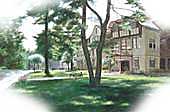Winter
2002
The Kingdom of God
Nancy Corlett
The central teaching of Jesus was the establishment of God's
Kingdom. From the beginning (Matt. 4:17), Jesus spoke primarily
of the Kingdom of God. He began the Sermon on the Mount (the
Beatitudes) with the Kingdom (Matt. 5:3). Jesus spoke of the
Kingdom throughout his ministry.
Scripture never really defines the Kingdom, but through a
series of parables and other teachings we have something better:
a graphic word-picture painted by the Master Himself. Often
we think of a kingdom as a geographical area, but it is the
authority of the sovereign that makes a kingdom.
As early as Exodus 19:6, the Lord speaks of making His people
a “kingdom of priests,” which is quoted in Rev
1:6. A priest represents God to men, and men to God. I Peter
2 speaks of all believers as being “a holy priesthood
to offer up spiritual sacrifices.” (verse 5), and “a
royal priesthood to shew forth the praises of him who hath
called you.” (verse 9).
This means not only with our lips, but in our lives. The
Amplified says, “display the virtues and perfections
of Him ...” The sacrifices of the Christian are spiritual
sacrifices. Jesus made the once-and-for-all sacrifice of Atonement.
But we are to make the “sacrifice of praise and thanksgiving”
(Psa. 107:22, Jer.33:11, Heb. 13:15), to “present our
bodies a living sacrifice” (Rom. 12:1), to “lay
down our lives for the brethren” (I John 3:16, Heb.
13:16).
Notice that this depends on our obedience (Exodus19:5). We
may see ourselves as “the land” over which He
is Absolute Ruler. There are no constitutional monarchies
or majority votes in God's Kingdom. Those are necessary in
the natural realm as a safe-guard to the abuses made by fallen
men, but our Lord's reign needs no such check-and-balance.
Jesus made it clear that He is bringing something new. He
says that the least in this Kingdom is greater than John the
Baptist. He emphasized that “the Kingdom of God is within
you,” and that it will apply to the entire world.
Jesus said that “The Kingdom of Heaven is at hand.”
(Matt. 4:17) and Luke 4:43 quotes Him as saying “I must
preach the kingdom of God.” He promises that some in
His audience will see within their lifetime the Kingdom (Luke
9:27). And this will be with power (Mark 9:1). In these, Jesus
is referring to Himself, the very embodiment of all that the
kingdom represents, and based on His perfect obedience to
the Father. In Luke 16:16, He says “The law and the
prophets were until John: since that time the kingdom of God
is preached, and every man presseth in.”
Jesus also tells us to pray “Thy kingdom come.”
It is here, but it is also to come. It is here in Him and
to the extent that His people are “conformed to His
Image.” It is future in that it is not complete in us,
and it is a long way from being fully established “on
earth as it is heaven,” when Jesus will be truly “King
of kings and Lord of lords.”
The difference between Salvation and the Kingdom is that
the former is what He did for us, taking care of our fundamental
problem, and coming out to meet us where we are, in order
to take us to where we belong. And, the Kingdom is where we
belong. They overlap because the “outworking of our
salvation” - coming into the reality of all He bought
for us - involves our entering the kingdom, taking the kingdom,
and occupying the kingdom. But they are not completely identical.
Matthew 13 is probably the most concise summary of the Kingdom,
although there are many other references. Through a series
of seven parables, from the planting of seeds to the harvest
(although He changes the metaphor to fish) He tells us several
things about the Kingdom: Much depends on receptivity; separation
of the wheat and tares is not our job, but must await God's
timing and method; the most glorious thing can grow from the
tiniest thing (a word here, a deed there); leaven, used elsewhere
in a negative sense, is used positively here to tell us that
a small hidden thing can have a big influence; this hidden
thing must be sought earnestly and will be found by those
who persevere; there will be a final judgment and separation.
It is a concise summary of past, present, and future - what
He did, what He is doing, and what He will do!
The Kingdom of God is part of the sovereign, free gift. Yet
we must choose it, and we must “press in” (Luke
16:16). Matt. 11:12 says it is taken by force. This “territory”
has been too long held by the enemy, and we must wrest it
from him.
It is to come in power (Mark 9:1, Romans 1:16), the power
“to will and to do” (Phil 2:13). When we read
all the related scriptures, we discover that Jesus came not
only to be the perfect example, but also to enable us to follow
His example.
This enablement is the unique aspect of the Christian Gospel.


